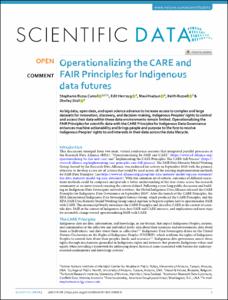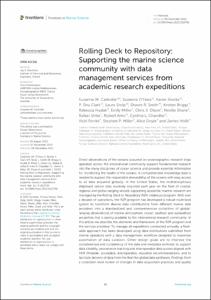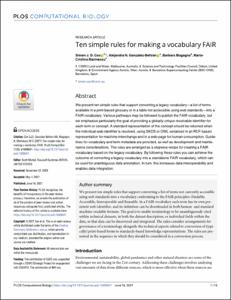Browsing by Subject "FAIR Principles"
Now showing items 1-8 of 8
-
Data discoverability and accessibility Report from workshops on marine imagery and biological specimen data, September 2018.
(Geoscience Australia, Marine Biodiversity Hub, Canberra Australia, 2019)As the rate of marine data acquisition increases, so too does the need for that data to abide by the FAIR (findable, accessible, interoperable, reusable) principles. From the nation’s perspective, a coherent and assessable ... -
FAIR Data Maturity Model Specification and Guidelines. [Proposed recommendation; version for public review]
(Research Data Alliance (RDA), 2020)The FAIR Data Maturity Model defines a set of indicators, their priorities and evaluation methods for the evaluation of the FAIR principles to be used as a common approach across assessment methodologies. This document ... -
JERICO-S3 D6.4 - WP6 - Best practices & recommendations for plankton imaging data management. Version 1.1.
(IFREMER for JERICO S3, Brest, France, 2023)Plankton imaging instruments are increasingly used to record species occurrences, and they are also able to repeatedly measure ecological traits. However, due to the extensive variety of instruments and the different formats ... -
Network harmonization recommendations. EuroSea Deliverable D3.7.
(EuroSea Project, 2022)This document proposes recommendations on metadata and information to be associated with marine data from ocean observation networks. The objective is to reach a common basis of metadata and information for any in situ ... -
Ocean Decade Data & Information Strategy.
(UNESCO, Paris, France, 2023)The United Nations Decade of Ocean Science for Sustainable Development (the ‘Ocean Decade’) seeks to transform humanity’s relationship with the ocean, applying the full range of ocean science and knowledge to diagnose ... -
Operationalizing the CARE and FAIR Principles for Indigenous data futures
(2021)As big data, open data, and open science advance to increase access to complex and large datasets for innovation, discovery, and decision-making, Indigenous Peoples’ rights to control and access their data within these ... -
Rolling Deck to Repository: Supporting the marine science community with data management services from academic research expeditions.
(2022)Direct observations of the oceans acquired on oceanographic research ships operated across the international community support fundamental research into the many disciplines of ocean science and provide essential ... -
Ten simple rules for making a vocabulary FAIR
(2021)We present ten simple rules that support converting a legacy vocabulary—a list of terms available in a print-based glossary or in a table not accessible using web standards—into a FAIR vocabulary. Various pathways may ...
 Repository of community practices in Ocean Research, Applications and Data/Information Management
Repository of community practices in Ocean Research, Applications and Data/Information Management







